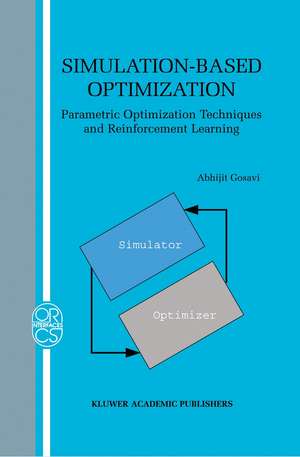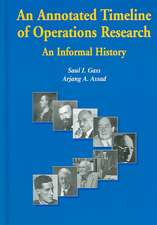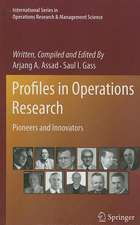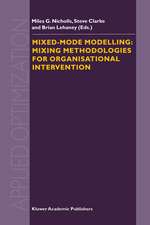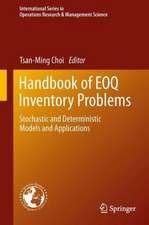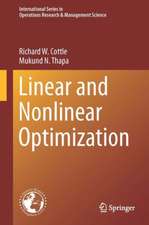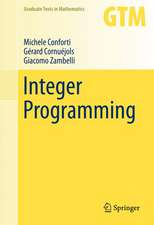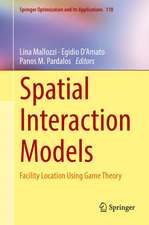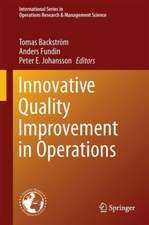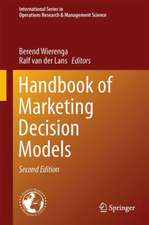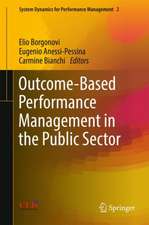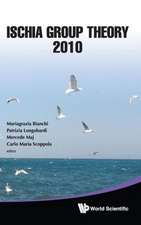Simulation-Based Optimization: Parametric Optimization Techniques and Reinforcement Learning: Operations Research/Computer Science Interfaces Series, cartea 25
Autor Abhijit Gosavien Limba Engleză Paperback – 2 dec 2010
The book's objective is two-fold: (1) It examines the mathematical governing principles of simulation-based optimization, thereby providing the reader with the ability to model relevant real-life problems using these techniques. (2) It outlines the computational technology underlying these methods. Taken together these two aspects demonstrate that the mathematical and computational methods discussed in this book do work.
Broadly speaking, the book has two parts: (1) parametric (static) optimization and (2) control (dynamic) optimization. Some of the book's special features are:
*An accessible introduction to reinforcement learning and parametric-optimization techniques.
*A step-by-step description of several algorithms of simulation-based optimization.
*A clear and simple introduction to the methodology of neural networks.
*A gentle introduction to convergence analysis of some of the methods enumerated above.
*Computer programs for many algorithms of simulation-based optimization.
| Toate formatele și edițiile | Preț | Express |
|---|---|---|
| Paperback (2) | 738.06 lei 6-8 săpt. | |
| Springer Us – 10 sep 2016 | 738.06 lei 6-8 săpt. | |
| Springer Us – 2 dec 2010 | 908.33 lei 38-45 zile | |
| Hardback (1) | 1011.10 lei 6-8 săpt. | |
| Springer Us – 30 oct 2014 | 1011.10 lei 6-8 săpt. |
Din seria Operations Research/Computer Science Interfaces Series
- 24%
 Preț: 921.99 lei
Preț: 921.99 lei - 18%
 Preț: 944.19 lei
Preț: 944.19 lei - 18%
 Preț: 1227.21 lei
Preț: 1227.21 lei - 18%
 Preț: 947.67 lei
Preț: 947.67 lei - 18%
 Preț: 1224.54 lei
Preț: 1224.54 lei - 20%
 Preț: 1792.96 lei
Preț: 1792.96 lei - 18%
 Preț: 944.82 lei
Preț: 944.82 lei - 20%
 Preț: 1289.93 lei
Preț: 1289.93 lei - 18%
 Preț: 961.23 lei
Preț: 961.23 lei - 18%
 Preț: 951.59 lei
Preț: 951.59 lei - 20%
 Preț: 1047.88 lei
Preț: 1047.88 lei - 20%
 Preț: 642.65 lei
Preț: 642.65 lei - 18%
 Preț: 944.82 lei
Preț: 944.82 lei - 20%
 Preț: 996.07 lei
Preț: 996.07 lei - 20%
 Preț: 989.13 lei
Preț: 989.13 lei -
 Preț: 379.09 lei
Preț: 379.09 lei - 18%
 Preț: 954.62 lei
Preț: 954.62 lei - 18%
 Preț: 945.30 lei
Preț: 945.30 lei - 18%
 Preț: 957.32 lei
Preț: 957.32 lei - 20%
 Preț: 996.88 lei
Preț: 996.88 lei - 15%
 Preț: 646.75 lei
Preț: 646.75 lei - 20%
 Preț: 1283.49 lei
Preț: 1283.49 lei - 18%
 Preț: 949.55 lei
Preț: 949.55 lei - 15%
 Preț: 658.88 lei
Preț: 658.88 lei - 18%
 Preț: 895.58 lei
Preț: 895.58 lei
Preț: 908.33 lei
Preț vechi: 1195.17 lei
-24% Nou
Puncte Express: 1362
Preț estimativ în valută:
173.81€ • 185.86$ • 144.92£
173.81€ • 185.86$ • 144.92£
Carte tipărită la comandă
Livrare economică 14-21 aprilie
Preluare comenzi: 021 569.72.76
Specificații
ISBN-13: 9781441953544
ISBN-10: 144195354X
Pagini: 584
Dimensiuni: 155 x 235 x 31 mm
Greutate: 0.81 kg
Ediția:Softcover reprint of hardcover 1st ed. 2003
Editura: Springer Us
Colecția Springer
Seria Operations Research/Computer Science Interfaces Series
Locul publicării:New York, NY, United States
ISBN-10: 144195354X
Pagini: 584
Dimensiuni: 155 x 235 x 31 mm
Greutate: 0.81 kg
Ediția:Softcover reprint of hardcover 1st ed. 2003
Editura: Springer Us
Colecția Springer
Seria Operations Research/Computer Science Interfaces Series
Locul publicării:New York, NY, United States
Public țintă
ResearchDescriere
Simulation-Based
Optimization:
Parametric
Optimization
Techniques
and
Reinforcement
Learningintroduces
the
evolving
area
of
simulation-based
optimization.
Since
it
became
possible
to
analyze
random
systems
using
computers,
scientists
and
engineers
have
sought
the
means
to
optimize
systems
using
simulation
models.
Only
recently,
however,
has
this
objective
had
success
in
practice.
Cutting-edge
work
in
computational
operations
research,
including
non-linear
programming
(simultaneous
perturbation),
dynamic
programming
(reinforcement
learning),
and
game
theory
(learning
automata)
has
made
it
possible
to
use
simulation
in
conjunction
with
optimization
techniques.
As
a
result,
this
research
has
given
simulation
added
dimensions
and
power
that
it
did
not
have
in
the
recent
past.
The book's objective is two-fold: (1) It examines the mathematical governing principles of simulation-based optimization, thereby providing the reader with the ability to model relevant real-life problems using these techniques. (2) It outlines the computational technology underlying these methods. Taken together these two aspects demonstrate that the mathematical and computational methods discussed in this book do work.
Broadly speaking, the book has two parts: (1) parametric (static) optimization and (2) control (dynamic) optimization. Some of the book's special features are:
*An accessible introduction to reinforcement learning and parametric-optimization techniques.
*A step-by-step description of several algorithms of simulation-based optimization.
*A clear and simple introduction to the methodology of neural networks.
*A gentle introduction to convergence analysis of some of the methods enumerated above.
*Computer programs for many algorithms of simulation-based optimization.
This book is written for students and researchers in the fields of engineering (electrical, industrial and computer), computer science, operations research, management science, and applied mathematics.
The book's objective is two-fold: (1) It examines the mathematical governing principles of simulation-based optimization, thereby providing the reader with the ability to model relevant real-life problems using these techniques. (2) It outlines the computational technology underlying these methods. Taken together these two aspects demonstrate that the mathematical and computational methods discussed in this book do work.
Broadly speaking, the book has two parts: (1) parametric (static) optimization and (2) control (dynamic) optimization. Some of the book's special features are:
*An accessible introduction to reinforcement learning and parametric-optimization techniques.
*A step-by-step description of several algorithms of simulation-based optimization.
*A clear and simple introduction to the methodology of neural networks.
*A gentle introduction to convergence analysis of some of the methods enumerated above.
*Computer programs for many algorithms of simulation-based optimization.
This book is written for students and researchers in the fields of engineering (electrical, industrial and computer), computer science, operations research, management science, and applied mathematics.
Cuprins
List
of
Figures.
List
of
Tables.
Acknowledgements.
Preface.
1.
Background.
1.1.
Why
this
book
was
written.
1.2.
Simulation-based
optimization
and
modern
times.
1.3.
How
this
book
is
organized.
2.
Notation.
2.1.
Chapter
Overview.
2.2.
Some
basic
conventions.
2.3.
Vector
notation.
2.4.
Notation
for
matrices.
2.5.
Notation
for
n-tuples.
2.6.
Notation
for
sets.
2.7.
Notation
for
sequences.
2.8.
Notation
for
transformations.
2.9.
Max,
min
and
arg
max.
2.10.
Acronyms
and
abbreviations.
3.
Probability
theory:
a
refresher.3.1.
Overview
of
this
chapter.
3.2.
Laws
of
probability.
3.3.
Probability
distributions.
3.4.
Expected
value
of
a
random
variable.
3.5.
Standard
deviation
of
a
random
variable.
3.6.
Limit
theorems.
3.7.
Review
questions.
4.
Basic
concepts
underlying
simulation.
4.1.
Chapter
overview.
4.2.
Introductions.
4.3.
Models.
4.4.
Simulation
modeling
of
random
systems.
4.5.
Concluding
remarks.
4.6.
Historical
remarks.
4.7.
Review
questions.
5.
Simulation
optimization:
an
overview.
5.1.
Chapter
overview.
5.2.
Stochastic
parametric
optimization.
5.3.
Stochastic
control
optimization.
5.4.
Historical
remarks.
5.5.
Review
questions.
6.
Response
surfaces
and
neural
nets.
6.1.
Chapter
overview.
6.2.
RSM:
an
overview.
6.3.
RSM:
details.
6.4.
Neuro-response
surface
methods.
6.5.
Concluding
remarks.
6.6.
Bibliographic
remarks.
6.7.
Review
questions.
7.
Parametric
optimization.
7.1.
Chapter
overview.
7.2.
Continuous
optimization.
7.3.
Discrete
optimization.
7.4.
Hybrid
solution
spaces.
7.5.
Concluding
remarks.
7.6.
Bibliographic
remarks.
7.7.
Review
questions.
8.
Dynamic
programming.
8.1.
Chapter
overview.
8.2.
Stochastic
processes.
8.3.
Markov
processes,
Markov
chains
and
semi-Markov
processes.
8.4.
Markov
decision
problems.
8.5.
How
to
solve
an
MDP
using
exhaustive
enumeration.
8.6.
Dynamic
programming
for
average
reward.
8.7.
Dynamic
programming
and
discounted
reward.
8.8.
The
Bellman
equation:
an
intuitive
perspective.
8.9.
Semi-Markov
decision
problems.
8.10.
Modified
policy
iteration.
8.11.
Miscellaneous
topics
related
to
MDPs
and
SMDPs.
8.12.
Conclusions.
8.13.
Bibliographic
remarks.
8.14.
Review
questions.
9.
Reinforcement
learning.
9.1.
Chapter
overview.
9.2.
The
need
for
reinforcement
learning.
9.3.
Generating
the
TPM
through
straightforward
counting.
9.4.
Reinforcement
learning:
fundamentals.
9.5.
Discounted
reward
reinforcement
learning.
9.6.
Average
reward
reinforcement
learning.
9.7.
Semi-Markov
decision
problems
and
RL.
9.8.
RL
algorithms
and
their
DP
counterparts.
9.9.
Act
Caracteristici
Accessible
introduction
to
reinforcement
learning
and
parametric-optimization
techniques
Step-by-step description of several algorithms of simulation-based optimization
Clear and simple introduction to the methodology of neural networks
Gentle introduction to convergence analysis of some of the methods enumerated above
Computer programs for many algorithms of simulation-based optimization
Step-by-step description of several algorithms of simulation-based optimization
Clear and simple introduction to the methodology of neural networks
Gentle introduction to convergence analysis of some of the methods enumerated above
Computer programs for many algorithms of simulation-based optimization
Notă biografică
Abhijit Gosavi is a leading international authority on reinforcement learning, stochastic dynamic programming and simulation-based optimization. The first edition of his Springer book “Simulation-Based Optimization” that appeared in 2003 was the first text to have appeared on that topic. He is regularly an invited speaker at major national and international conferences on operations research, reinforcement learning, adaptive/approximate dynamic programming, and systems engineering.
He has published more than fifty journal and conference articles – many of which have appeared in leading scholarly journals such as Management Science, Automatica, INFORMS Journal on Computing, Machine Learning, Journal of Retailing, Systems and Control Letters and the European Journal of Operational Research. He has also authored numerous book chapters on simulation-based optimization and operations research. His research has been funded by the National Science Foundation, Department of Defense, Missouri Department of Transportation, University of Missouri Research Board and industry. He has consulted extensively for the U.S. Department of Veterans Affairs and the mass media as a statistical/simulation analyst. He has received teaching awards from the Institute of Industrial Engineers.
He currently serves as an Associate Professor of Engineering Management and Systems Engineering at Missouri University of Science and Technology in Rolla, MO. He holds a masters degree in Mechanical Engineering from the Indian Institute of Technology and a Ph.D. in Industrial Engineering from the University of South Florida. He is a member of INFORMS, IIE and ASEE.
He has published more than fifty journal and conference articles – many of which have appeared in leading scholarly journals such as Management Science, Automatica, INFORMS Journal on Computing, Machine Learning, Journal of Retailing, Systems and Control Letters and the European Journal of Operational Research. He has also authored numerous book chapters on simulation-based optimization and operations research. His research has been funded by the National Science Foundation, Department of Defense, Missouri Department of Transportation, University of Missouri Research Board and industry. He has consulted extensively for the U.S. Department of Veterans Affairs and the mass media as a statistical/simulation analyst. He has received teaching awards from the Institute of Industrial Engineers.
He currently serves as an Associate Professor of Engineering Management and Systems Engineering at Missouri University of Science and Technology in Rolla, MO. He holds a masters degree in Mechanical Engineering from the Indian Institute of Technology and a Ph.D. in Industrial Engineering from the University of South Florida. He is a member of INFORMS, IIE and ASEE.
Textul de pe ultima copertă
Simulation-Based Optimization: Parametric Optimization Techniques and Reinforcement Learning introduces the evolving area of static and dynamic simulation-based optimization. Covered in detail are model-free optimization techniques – especially designed for those discrete-event, stochastic systems which can be simulated but whose analytical models are difficult to find in closed mathematical forms.
Key features of this revised and improved Second Edition include:
· Extensive coverage, via step-by-step recipes, of powerful new algorithms for static simulation optimization, including simultaneous perturbation, backtracking adaptive search, and nested partitions, in addition to traditional methods, such as response surfaces, Nelder-Mead search, and meta-heuristics (simulated annealing, tabu search, and genetic algorithms)
· Detailed coverage of the Bellman equation framework for Markov Decision Processes (MDPs), along with dynamic programming (value and policy iteration) for discounted, average, and total reward performance metrics
· An in-depth consideration of dynamic simulation optimization via temporal differences and Reinforcement Learning: Q-Learning, SARSA, and R-SMART algorithms, and policy search, via API, Q-P-Learning, actor-critics, and learning automata
· A special examination of neural-network-based function approximation for Reinforcement Learning, semi-Markov decision processes (SMDPs), finite-horizon problems, two time scales, case studies for industrial tasks, computer codes (placed online), and convergence proofs, via Banach fixed point theory and Ordinary Differential Equations
Themed around three areas in separate sets of chapters – Static Simulation Optimization, Reinforcement Learning, and Convergence Analysis – this book is written for researchers and students in the fields of engineering (industrial, systems, electrical, and computer), operations research, computer science, and applied mathematics.
Key features of this revised and improved Second Edition include:
· Extensive coverage, via step-by-step recipes, of powerful new algorithms for static simulation optimization, including simultaneous perturbation, backtracking adaptive search, and nested partitions, in addition to traditional methods, such as response surfaces, Nelder-Mead search, and meta-heuristics (simulated annealing, tabu search, and genetic algorithms)
· Detailed coverage of the Bellman equation framework for Markov Decision Processes (MDPs), along with dynamic programming (value and policy iteration) for discounted, average, and total reward performance metrics
· An in-depth consideration of dynamic simulation optimization via temporal differences and Reinforcement Learning: Q-Learning, SARSA, and R-SMART algorithms, and policy search, via API, Q-P-Learning, actor-critics, and learning automata
· A special examination of neural-network-based function approximation for Reinforcement Learning, semi-Markov decision processes (SMDPs), finite-horizon problems, two time scales, case studies for industrial tasks, computer codes (placed online), and convergence proofs, via Banach fixed point theory and Ordinary Differential Equations
Themed around three areas in separate sets of chapters – Static Simulation Optimization, Reinforcement Learning, and Convergence Analysis – this book is written for researchers and students in the fields of engineering (industrial, systems, electrical, and computer), operations research, computer science, and applied mathematics.
